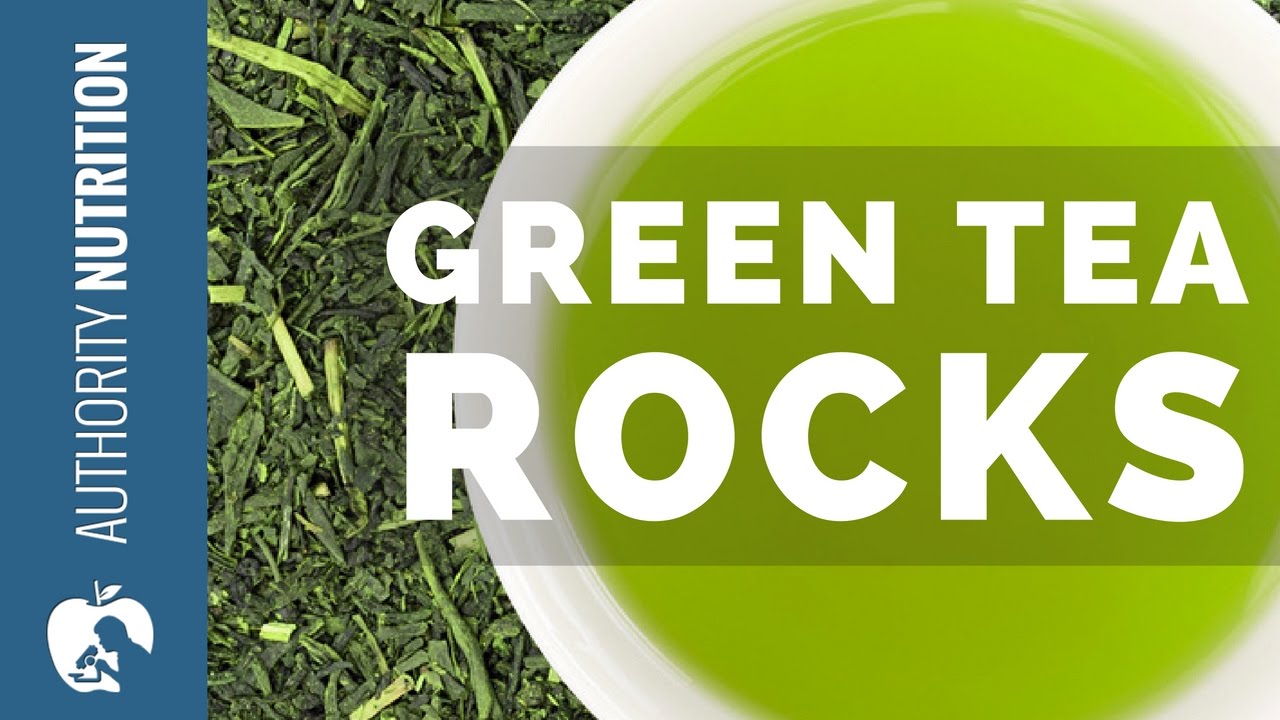5 Epic Health Benefits of Green Tea

5 Epic Health Benefits of Green Tea
1. Compounds in Green Tea Can Improve Brain Function and Make You Smarter
Green tea contains caffeine, which is a known stimulant that can temporarily heighten brain function. But it also contains the amino acid L-theanine which gives it an edge over coffee.
L-theanine crosses the blood-brain barrier and increases the activity of neurotransmitters, dopamine and the production of alpha waves in the brain.
More importantly, studies show that caffeine and L-theanine can have synergistic effects. That is, the combination of the two has unique effects on brain function.
This includes subtle improvements to alertness, attention and perhaps sensory outcomes. Many people also report having more stable energy and being much more productive when they drink green tea, compared to coffee.
2. Green Tea May Protect Your Brain in Old Age
Not only can green tea improve brain function in the short term, it may also protect your brain as we grow older.
Alzheimer’s and Parkinson’s disease are the most common neurodegenerative diseases in humans.
Multiple studies show that the catechin compounds in green tea can have various protective effects on neurons, potentially lowering the risk of Alzheimer’s and Parkinson’s.
But this has only been shown in test tubes and animal studies so far, not in humans. Until then we can’t say for sure, but it’s highly plausible.
3. Green Tea Reduces Risk of Cardiovascular Disease
Cardiovascular diseases, including heart disease and stroke, are the biggest causes of death in the world.
Studies show that green tea can improve some of the main risk factors for these diseases, particularly high blood pressure and high LDL cholesterol.
Green tea catechins appear to be the active ingredients here, with review studies consistently finding improvements.
Interestingly a study in over 19,000 middle-aged and older Chinese people found that those who drank the most green tea were 11% less likely to get heart disease during the 5 year study period.
4. Green Tea May Lower Your Risk of Type 2 Diabetes
Type 2 diabetes now afflicts about 300 million people worldwide, and involves having elevated blood sugar levels in the context of insulin resistance.
Studies often show that green tea can improve insulin sensitivity and reduce blood sugar levels. As with the heart health benefits Green tea catechins are heavily involved.
According to a review of 7 studies with a total of 286,701 individuals, green tea drinkers had an 18% lower risk of becoming diabetic. Of course this is observational and doesn’t prove cause and effect, but something is definitely going on with its effects on overall metabolic health.
5. Green Tea May Extend Your Lifespan, Helping You Live Longer
Given that green tea drinkers are at a lower risk of cardiovascular-related health problems, it makes sense that it could help you live longer.
In an observational study of 40,530 Japanese adults, those who drank the most green tea (5 or more cups per day) were significantly less likely to die during an 11 year period.
– Death of all causes: 23% lower in women, 12% lower in men.
– Death from heart disease: 31% lower in women, 22% lower in men.
– Death from stroke: 42% lower in women, 35% lower in men.
Another Japanese study of almost 100,000 middle-aged and older adults found that those who drank the most green tea were roughly 15% less likely to die from heart disease during the 19-year study period.
The perks of green tea are pretty impressive huh.
So then the question remains, if you don’t drink green tea, and it’s available to you, why not?
Studies mentioned:
STUDY 1: https://www.ncbi.nlm.nih.gov/pubmed/25761837
STUDY 2: https://www.ncbi.nlm.nih.gov/pubmed/24946991
STUDY 3: https://www.ncbi.nlm.nih.gov/pubmed/12875608
STUDY 4: https://www.ncbi.nlm.nih.gov/pubmed/19040558
STUDY 5: https://www.ncbi.nlm.nih.gov/pubmed/15350981
STUDY 6: https://www.ncbi.nlm.nih.gov/pubmed/24861099
STUDY 7: https://www.ncbi.nlm.nih.gov/pubmed/25479028
STUDY 8: https://www.ncbi.nlm.nih.gov/pubmed/27072746
STUDY 9: https://www.ncbi.nlm.nih.gov/pubmed/25900254



![[ID: Hx_A0iLhdr8] Youtube Automatic](https://bizimtube.com/wp-content/uploads/2021/03/id-hxa0ilhdr8-youtube-automatic-236x133.jpg)
![[ID: lp7w0UmpuIs] Youtube Automatic](https://bizimtube.com/wp-content/uploads/2021/03/id-lp7w0umpuis-youtube-automatic-236x133.jpg)
![[ID: s2-7T1TH-lY] Youtube Automatic](https://bizimtube.com/wp-content/uploads/2021/03/id-s2-7t1th-ly-youtube-automatic-236x133.jpg)
![[ID: b_lakC9M4UQ] Youtube Automatic](https://bizimtube.com/wp-content/uploads/2021/03/id-blakc9m4uq-youtube-automatic-236x133.jpg)
![[ID: r44yl6nPONs] Youtube Automatic](https://bizimtube.com/wp-content/uploads/2021/03/id-r44yl6npons-youtube-automatic-236x133.jpg)
![[ID: pAwto1YQjA8] Youtube Automatic](https://bizimtube.com/wp-content/uploads/2021/03/id-pawto1yqja8-youtube-automatic-236x133.jpg)
![[ID: XETG8azHiv4] Youtube Automatic](https://bizimtube.com/wp-content/uploads/2021/03/id-xetg8azhiv4-youtube-automatic-236x133.jpg)
![[ID: f3G_-S_2HUk] Youtube Automatic](https://bizimtube.com/wp-content/uploads/2021/03/id-f3g-s2huk-youtube-automatic-236x133.jpg)
![[ID: G8oWns54snA] Youtube Automatic](https://bizimtube.com/wp-content/uploads/2021/03/id-g8owns54sna-youtube-automatic-236x133.jpg)
![[ID: s0lIFXhu6aw] Youtube Automatic](https://bizimtube.com/wp-content/uploads/2021/03/id-s0lifxhu6aw-youtube-automatic-236x133.jpg)
![[ID: 4UTd2Ev8eYg] Youtube Automatic](https://bizimtube.com/wp-content/uploads/2021/03/id-4utd2ev8eyg-youtube-automatic-236x133.jpg)
![[ID: RKBGBjVJBxQ] Youtube Automatic](https://bizimtube.com/wp-content/uploads/2021/03/id-rkbgbjvjbxq-youtube-automatic-236x133.jpg)